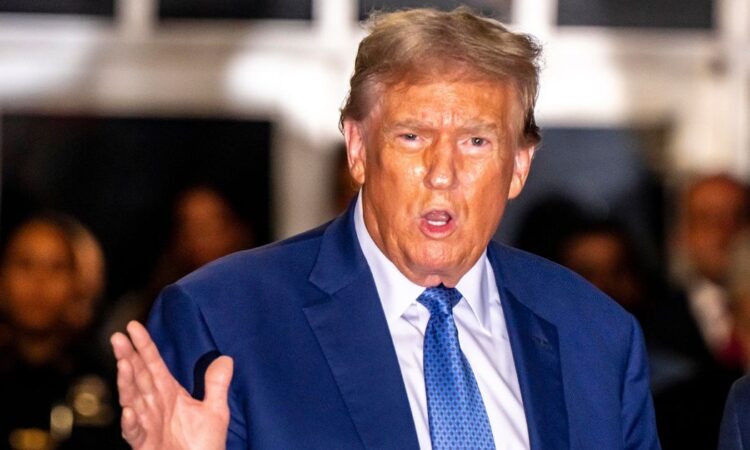
Former US president Donald Trump has pleaded not guilty to 34 felony counts of falsifying business records in his hush money trial – but there are still some unanswered questions
Donald Trump‘s hush money trial has entered its 20th day and witness testimony could end on Tuesday with the defence expected to rest its case.
The case is the first-ever criminal trial of a former US president and the first of four prosecutions of Trump to reach a jury. Trump has pleaded not guilty to 34 felony counts of falsifying business records. At the centre of the charges is a $130,000 (£103,000) hush-money payment by lawyer Michael Cohen to adult film star Stormy Daniels who alleged she had an affair with Trump.
Trump is accused of covering up payments he had his lawyer make to allegedly conceal a sex scandal before the 2016 election. Here, we look at some of the unanswered questions about the trial.
READ MORE: Donald Trump complains about ‘ice-box’ courtroom again as he continues to ‘nod off’ during trial
Will Trump take the stand?
It is not clear whether Trump will testify at his hush money trial. Last week, defence attorney Todd Blanche answered “no” when Judge Juan Merchan asked if he had any “indication” of whether Trump would testify or whether any “determination” had been made on the issue.
When the trial got underway, Trump publicly committed to testifying as he told reporters: “All I can do is tell the truth. And the truth is that there’s no case.” However, in an interview with Newsmax on April 26, the ex-president said he would testify “if it’s necessary.”
Trump attorney Alina Habba, who is not representing him in the case, said he “wants to testify” and is “willing” and “able”. However, he will need to “listen to his attorneys” and decide what to do with them.
Closing arguments
Closing arguments in Trump’s criminal trial could take place the day after Memorial Day, May 28. Judge Juan M. Merchan said Monday that when the defence rests its case, he will send the jury home until closing arguments on the day after Memorial Day. Should that happen, jurors will spend a full week away from the trial.
Merchan cited scheduling issues in giving the May 28 date. The defence is expected to rest its case on Tuesday after calling just a handful of witnesses, including attorney Robert Costello.
For all the latest on news, politics, sports, and showbiz from the USA, go to The Mirror US.
Could trial lead to Trump’s conviction?
Currently, it is not clear if Trump will be charged as an expert explained that the prosecution would need to prove the former president falsified business records in furtherance of a separate crime. Gregory Germain, an attorney and law professor at Syracuse University, told ABC News: “They’re missing elements in the prosecution’s case that they would have to establish in order to convict them.”
He added: “If the judge skirts over the difficult legal issues of the case and oversimplifies what they have to find, then I think the jury will probably find him guilty. My fear is that the judge will gloss over the legal issues and just say to the jury: do you believe that Trump falsified business records in order to hide information from the public during an election? And he’s likely guilty of that, but I don’t think that constitutes a crime.”
Chris Timmons, a former prosecutor, said that in order to convict Trump, the prosecution needs to prove to the jury that he knew he allegedly falsified the records and that this was being done for political reasons. He said: “It’s a little bit of a technical charge and so the jury may struggle with that.”
Sex and privacy
Since the case is based on an alleged sexual encounter between Trump and Daniels, Boston University law professor Jed Shugerman said “there is a possibility that some jurors thought it was just way too much and [her] testimony may have backfired with them.” In this case, it would be argued for Trump’s defence, Mr Shugerman argued, adding: “If [jurors] think politicians have a right, like any other American, to engage in nondisclosure agreements to protect their privacy, some of them may be wondering what was the crime here.”
Risk of mistrial
There is a possibility that the judge declares a mistrial – meaning that the case is inconclusive and has to be dismissed – if the jury is unable to reach a verdict, said Mr Timmons. However, he said this is unlikely as it usually does not happen in long cases when a lot of time and resources have been spent on the proceedings.
Possible appeal
If Trump is found guilty, he is likely to appeal the decision, but according to Mr Germain, this could take years – and is unlikely to be resolved before this autumn’s election. He said: “Unless the court expedited it, it wouldn’t be resolved before the election. And I don’t think they would expedite it if it was just a conviction in which he didn’t go to jail.”
He added that in case Trump is sentenced to jail, it is possible that an expedited schedule would be set to see whether he should be released. The expert said: “For nonviolent, first time offenders like Trump, you would almost never get jail time. So it would be extraordinary and contrary to the guidelines to sentence Trump to prison, even if he is convicted of these charges.”






